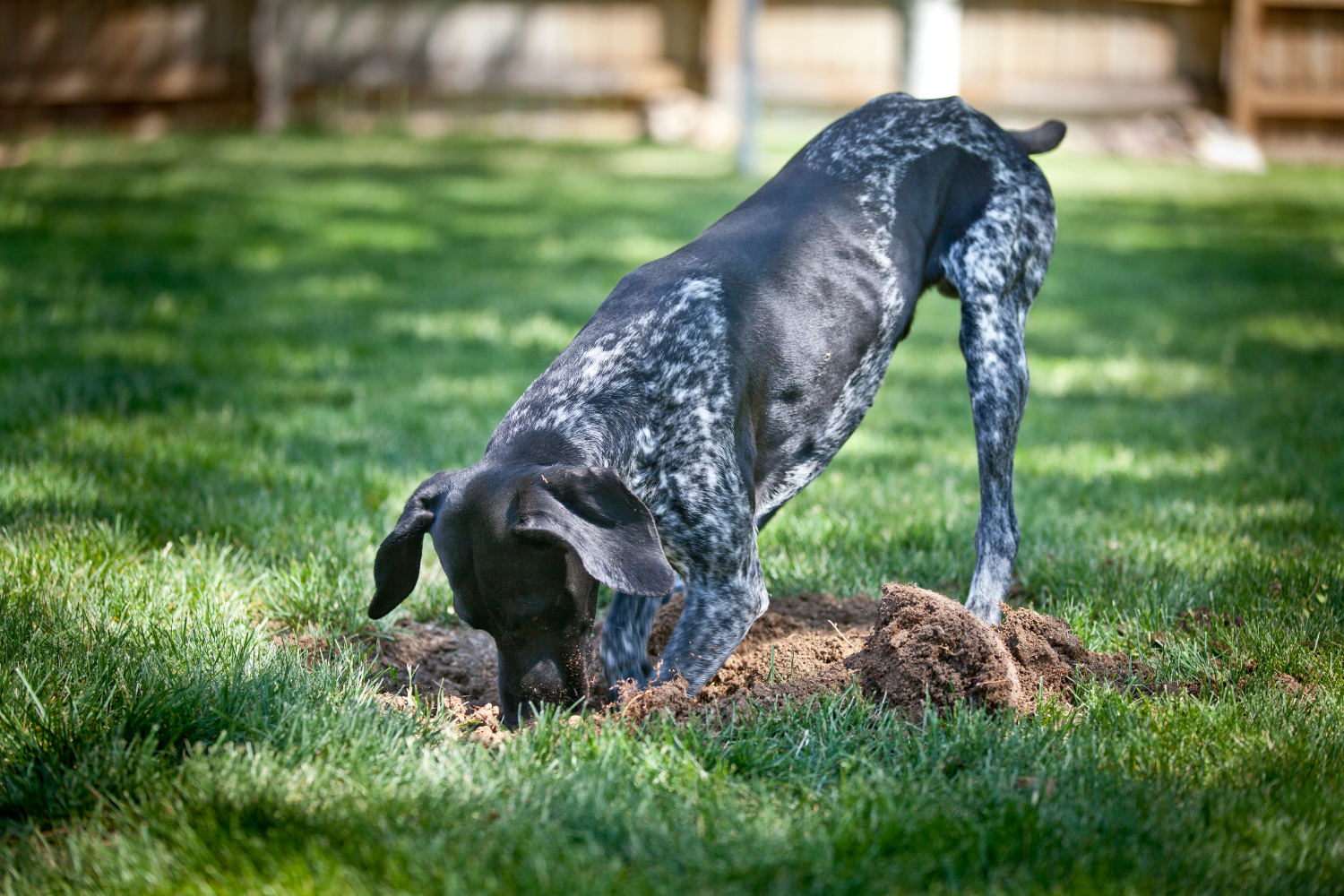
Why is my old dog scratching the carpet?
23rd January, 2023
Monitoring your older dog’s health and behaviour is a key part of being a loving and responsible owner – right up there with arranging suitable pet insurance for senior dogs.
One behaviour you may not have been expecting from your senior pet, though, is a sudden compulsion to scratch or even dig up your carpets. If your dog is suddenly taking an excessive interest in your soft floors, you may well be wondering what’s caused this new and unexplained characteristic.
The truth is that there are several possible reasons that dogs may dig and scratch at the carpet. It might simply be homing in on a favourite spot and making it as comfortable as they can.
However, there can be other reasons why your dog is pawing away at your lovely floors. Let’s look at these in turn. You can also find some answers in our article on understanding how dogs age.
-
They’re feeling bored or frustrated
It’s well known that some dogs simply have more energy then others. The same animals are likely to be the ones that get bored most easily, without enough mental and physical stimulus to occupy those busy minds and bodies.
Boredom in dogs can often result in destructive behaviours. We looked at this kind of destructive chewing in a little more detail when we discussed how your older dog can sometimes seem to act like a puppy again.
Added to this, it’s worth noting that some dog breeds are naturally more energetic, and less unsuitable for leaving alone, than others. Certain breeds, such as the poodle, greyhound and bullmastiff, are fairly self-sufficient and low-maintenance.
Other breeds, including the Border Collie, Cavalier King Charles Spaniel and Yorkshire Terrier, need lots of company and stimulus.
If you do have to leave them on their own, make sure that they have some interesting and interactive toys to play with in your absence.
Bones or Kong toys might be a good option here - a puzzle that’s also a treat! Your carpets and soft furnishing will probably thank you in the long run!
-
They are feeling frightened or anxious
Take some time to observe exactly when your dog is displaying this new scratching or digging behaviour inside the home.
Is there an obvious cue or trigger for it? Something that seems to occur just before they start to scratch or dig? Perhaps when you go to the vet?
It could be that an unfamiliar or alarming noise is provoking this new behaviour. As we saw in the introduction, dogs scratch and dig away at surfaces in an effort to make their home space cosy and welcoming.
It's quite possible that there’s a certain noise or disturbance around the home that is making them feel anxious or afraid – and the scratching or digging is a natural response, a way to find themselves a moment of calm away from the unwelcome intrusion.
Another possible trigger for their anxiety is when you leave the house every day. As we saw in our first point above, certain dog breeds or individuals don’t like to be left alone.
Being left alone can make some animals feel frustrated, with no outlet for their energy. However, it’s also possible that finding themselves alone triggers a more emotional response.
Your dog may get very anxious and even frightened without their human companion by their side. Indeed, there’s even a name for this kind of emotional response.
It’s called separation anxiety, and many dogs show this nervous, agitated state when they are away from their human for a longer period of time.
Separation anxiety is one of the behaviours we looked at in our article on behaviour problems in older dogs.
If your dog displays acute separation anxiety, or if their behaviour in your absence becomes destructive, you may want to seek help from an animal behaviourist.
-
It may be an illness that’s causing this unusual behaviour
There is another possible cause for this new destructive behaviour in your pet. Certain illnesses can provoke unusual habits.
At the most extreme, some neurological disorders can cause unexpected behaviours. If you suspect that your dog’s erratic actions could be caused by some problem with their brain, it’s essential to get them seen by a vet as soon as possible.
A tumour, for example, would definitely result in them behaving differently from normal.
Get them seen by a vet as quickly as you can. They will be able to perform some tests to work out exactly what is wrong. They will then be able to recommend the right treatment.
You may be worrying about how much all of this may cost. However, as we discuss in our section below on pet insurance for senior dogs, a suitable insurance policy might be able to contribute towards these costs.
What sort of carpeting is best for scratch-happy dogs?
If your dog is given to scratching the carpets, it’ll help to have some pretty robust material covering your floors. A hard-wearing carpet should withstand a few months or even years of scratching, whereas more flimsy carpets may need to be replaced frequently.
You may also want to use one or more products to protect your carpets from unwanted scratching. Be a little careful here, however, as some of these products can be toxic to dogs.
Try to steer clear of any products that contain so-called volatile organic compounds, often abbreviated as VOCs on the label. These chemicals can cause nausea, fatigue and dizziness, as well as skin reactions and eye, nose and throat irritations, in both dogs and cats.
You may prefer to take a different approach to carpeting, by laying down carpet tiles instead of full-size carpets. This way, if one or more individual tiles get dirty or damaged, replacing them is much easier and less expensive than taking up an entire carpet.
Whether you go for tiles or a full-length carpet, you may want to consider choosing something with a tight weave. Looser weave carpets can present a hazard to dogs, as they can snag their claws within the fibres.
That won’t be good – either for your carpet or your dog! Torn claws are more susceptible to infections, which could lead to your dog contracting an illness.
If you have pet insurance for senior dogs through Petwise, you’ll be able to talk to a vet 24/7 via video call. However, it’s better to minimise the risk of your beloved pet developing any infections from carpet injuries in the first place.
5 top tips for dogs and hard-wood floors
If you have hard wooden floors, here are five quick tips to stop them from getting damaged by your dog:
- Wax your floors - a layer of wax will help both you and your dog get a grip.
- Keep their nails short - get your dog’s nails clipped regularly to avoid scratches.
- Exercise your older pet - if your pet is pacing around on your floors, take them out for a walk.
- Try a runner - a carpet runner can help save your floors and your dog’s nails from becoming damaged.
- Dog shoes - invest in some new footwear for your ageing canine to keep their nails and delicate paws protected.
Digging behaviours

So far we’ve looked at how this urge to scratch or dig manifests itself indoors, with your carpets taking most of the punishment.
Let’s now look at the reasons – some similar, others slightly different – that lead to dogs digging compulsively in your garden. How serious is this digging habit; what’s causing it; and what steps can you take to stop it?
Although your dog may get great enjoyment from digging in your garden, it’s definitely a habit you need to monitor and – possibly – put a stop to.
Digging (anywhere apart from a dedicated digging space) can result in damage to your property. There’s also the danger that your dog, accidentally or intentionally, digs themselves an escape route out of your garden.
Other potential harmful effects of digging can include broken nails on a dog’s paws, with the risk of infections. They may also stumble or trip in holes that have been dug previously.
Finally, dogs who dig run a risk of being exposed to certain bacteria and parasites that live within the soil. One of the more serious illnesses to which digging can expose them is leptospirosis, or Weil’s disease.
This lethal disease spreads via infected mice, rats, cows and dogs: it can also be caught from drinking water or burrowing in soil that carries the infection.
The disease can kill – but a vaccination is available. In fact, the UK government point out that the vaccination for leptospirosis, makes up one of the four basic vaccines recommended to all UK dogs.
4 reasons why dogs dig outdoors
Dogs may start digging outdoors for a number of reasons. Here are the main four:
-
It’s in their DNA
All dogs have the impulse to dig buried deep in their genes – it is as much a part of their makeup as eating or sleeping.
The urge to excavate may be stronger in some breeds than others – particularly those types that have been deliberately bred to carry out this kind of duty.
This includes the Terrier family, who were bred to flush creatures out of their burrows. Beagles, Jack Russells and Dachshunds are just a few of the other breeds with a strong urge to explore underground.
-
They are digging to relax
Much like scratching at the carpets that we mentioned above, digging can simply be a way for a dog to relax and de-stress.
Again, reasons for your dog feeling stressed include being left alone for too long, or not getting enough exercise.
Other factors can cause them anxiety, too. For example, if there’s a new pet arriving in the household, this is likely to make your existing pet anxious for a while.
-
They have something to hide
You may have noticed that your pet likes to hide favourite toys or treats. This can be especially common in busy households where dogs need to have their moments of peace, away from small children or other pets who may compete for treats and toys.
Dogs who take their treats into another room (or into the garden) to enjoy in peace are exhibiting perfectly normal canine behaviour. In fact, this can be quite a positive characteristic as, for many dogs, hiding a favourite toy provides some much-needed mental stimulation.
However, if it means that they feel the need to start digging up the garden to secrete their favourite things, you may need to look for an alternative way of giving them some privacy.
-
They are planning an escape
Now, let’s just be clear: we’re sure that your older dog has a lovely life with you. It’s just that some dogs, however happy the domestic environment, have an irresistible urge to break free and explore the wider world beyond the garden gate.
They may have tried getting over the fence and been thwarted. If so, their next option is to tunnel under and out. And, in truth, if they can dig a deep enough hole, they may be able to dig their way out of your garden.
If you do notice your dog frequently digging around near the base of your garden fence, it is quite possible they are trying to get out. You should do whatever you can to stop them from doing this.
This is a particular risk in the summer. As we have noted in a separate article, more pets go missing in summer than in the other seasons of the year.
If the worst does happen and your beloved pet goes missing, help may be at hand from the provider of your pet insurance for senior dogs. At Petwise we’ll cover loss by theft or straying up to £2,000 with our Premier Lifetime cover.
Final thoughts
Dogs can develop a love of scratching your carpets at any stage in their life. But, while your pooch may enjoy (and find reassurance from) this habit, it can end up quite an expensive one for you.
It’s important to try and get to the bottom of why your dog is scratching at the carpets. Pinpointing exactly what’s making them act in this way will have two benefits.
For one thing, you will eliminate or at least reduce a behaviour that could otherwise take out quite a lot of money from your household budget. For another, and perhaps most importantly, your dog’s new passion for scratching could be evidence of something you need to look at more seriously – such as anxiety or an illness.
When it comes to dogs digging in the garden, there is a very real danger of your dog going missing, or picking up a disease from the soil.
Make sure you look under your sofas, beds and chairs for missing toys before you call the vet - they might just be trying to reach that favourite play thing!
Whichever scratching or digging habit your dog is exhibiting, it’s definitely best to try and keep it in check as soon as possible.
Pet insurance for senior dogs
Digging is a natural behaviour for dogs, but if you’re worried about your older dog’s digging habits, talk to the professionals.
Here at Petwise, you have access to 24/7 vet video calls, so you can get help when you need it most.
Picking up a disease from digging could mean your older dog needs medical treatment or even emergency care. That’s where pet insurance for senior dogs is so handy, helping you cover those unexpected costs.
Time-limited and lifetime pet insurance

We offer two different types of cover at Petwise. Both offer pet insurance for senior dogs – but each one provides this cover in a slightly different way.
Time-limited insurance
Our most affordable policies offer a type of pet insurance known as time-limited pet insurance. With this form of insurance, owners are covered for the costs of treatment of various accidents or illnesses.
For example, at Petwise we offer two levels of time-limited insurance. These allow you £2,000 and £4,000 respectively to spend on treating each separate condition.
So, let’s imagine you took out the latter policy. If your dog did then develop a new illness, you would have up to £4,000 to spend on treating that condition.
If they also developed, say for example, arthritis, there would be a further £4,000 available for treatment here. This allowance is duplicated for any other illnesses they might develop.
It’s important to note, with time-limited insurance, that the cover must be spent within a fixed time period. So, for example, you would not get that £4,000 to spend on your dog’s arthritis across their whole lifetime, but instead the limit is spread across one single year (12 months) of treatment from when the condition was first noted.
When one of the limits is reached, whether the time limit or financial limit, there is no further cover for that condition.
With time-limited insurance, if you make a claim for treatment mid-way through the policy year, your remaining time limit is carried over to the next policy year provided the policy is renewed and the financial limit has not been exhausted.
Lifetime insurance
We also offer five different levels of lifetime pet insurance. This is the more expensive type of pet insurance for senior dogs. However, as you might expect, it also provides the more comprehensive coverage.
With lifetime insurance, you get an annual policy limit combined for all medical condition that might require treatment. The difference here is that the cover is continuous – and that the annual limit resets each year you renew the policy.
This gives you long-term protection for your cherished pet.
Other benefits cover through Petwise include (*terms, conditions and exclusions apply):
- 24/7 vet video calls
- Dental cover as standard
- Farewell cover included
- Bereavement helpline
Remember there’s no upper joining age limit - we specialise in finding protection for senior dogs aged seven years and older.
Here at Petwise, we understand how dogs age. Why not contact us for a quote for time-limited or lifetime insurance today?